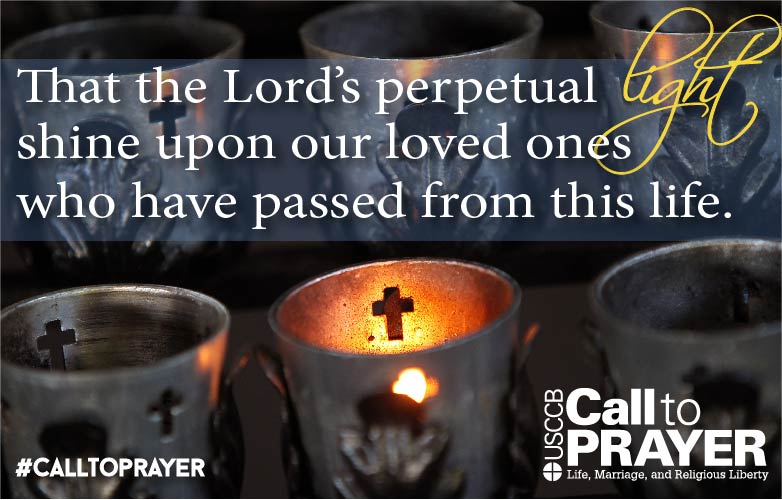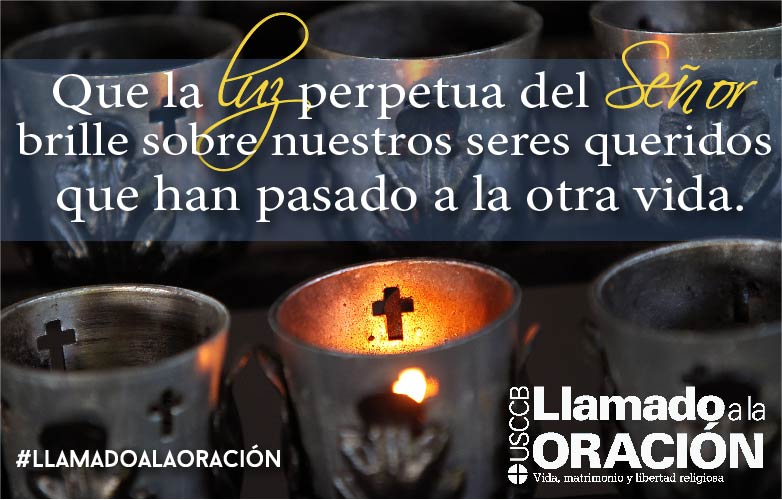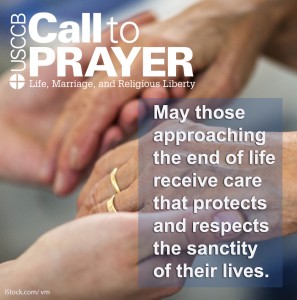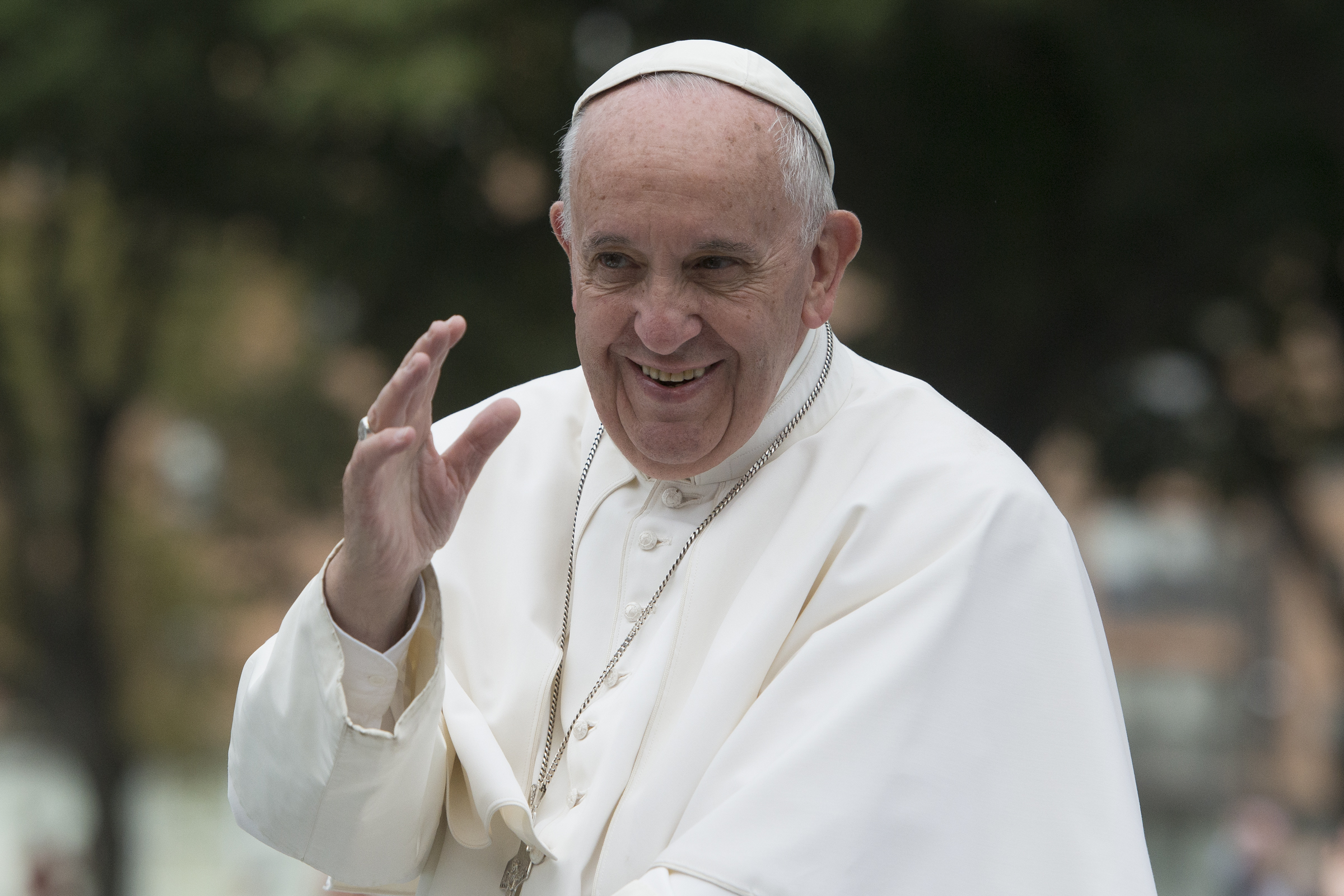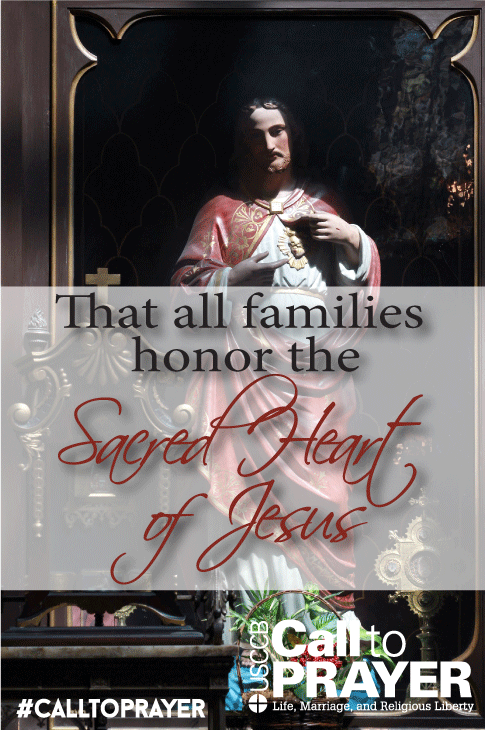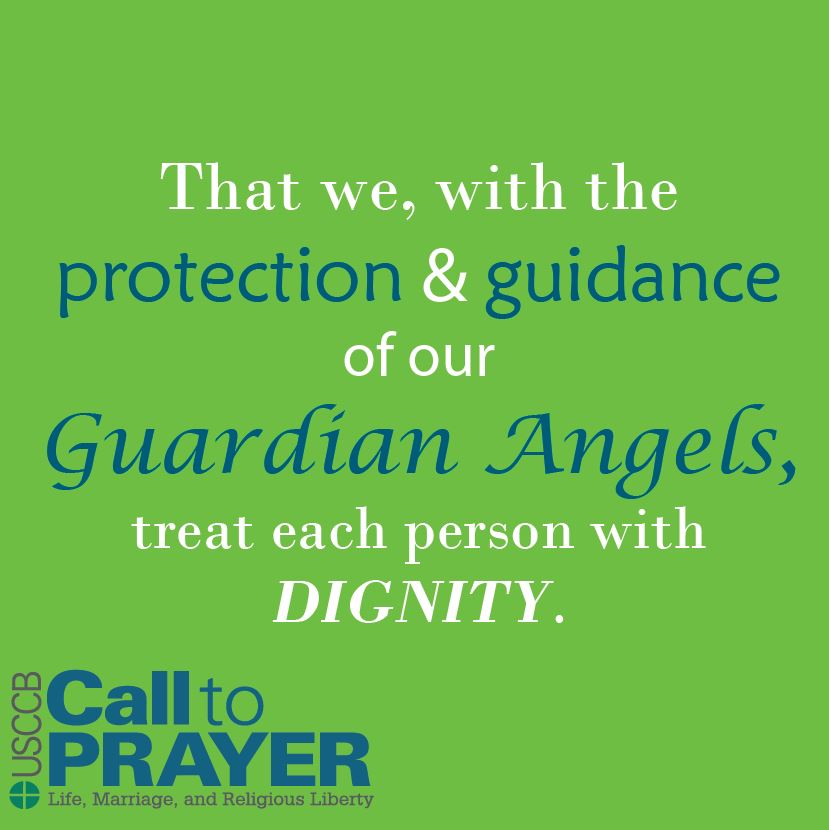Call to Prayer: October 30, 2015
And in Spanish:
Archive
Civil marriage and the Sacrament: Pope Francis
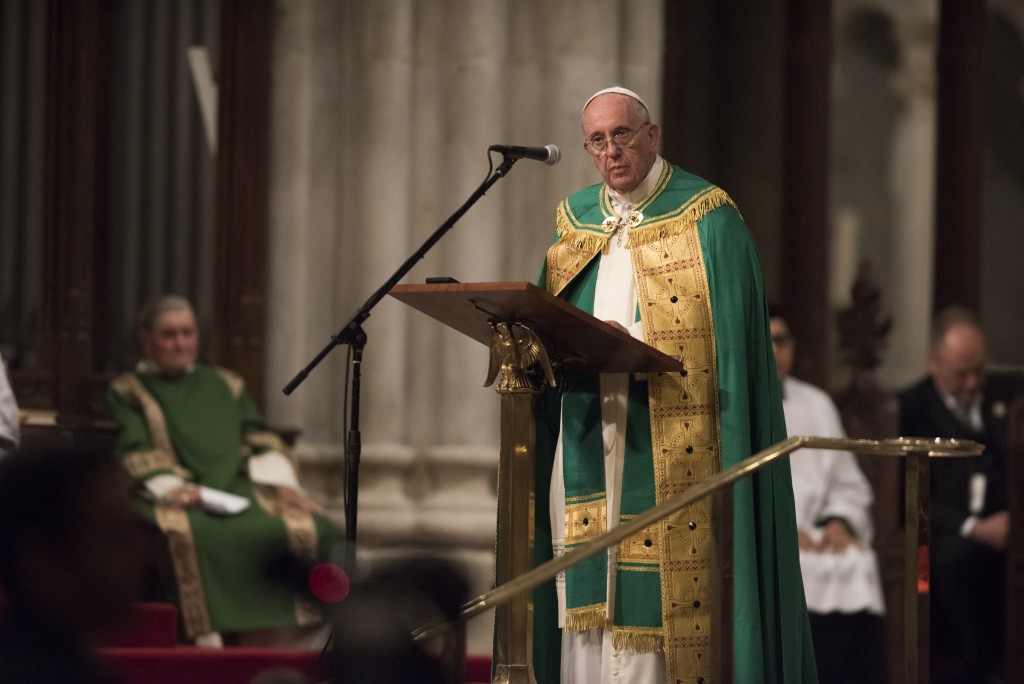 Photo credit: Jeffrey Bruno
Photo credit: Jeffrey Bruno
Pope Francis’s trip to the United States in September centered on his appearance at the World Meeting of Families in Philadelphia. Here is the fourth quote in the series, from the meeting with bishops on September 26:
“Until recently, we lived in a social context where the similarities between the civil institution of marriage and the Christian sacrament were considerable and shared. The two were interrelated and mutually supportive. This is no longer the case.”
Pope Francis acknowledges the rift that has opened up between the civil and religious conception of what marriage is. This rift did not begin on June 26th, 2015, but rather has its roots in the so-called “sexual revolution.”
Think about the essentials of marriage, according to Catholic teaching: unity, indissolubility, and procreation. The dominant American culture and society have rejected these truths systematically for about the last 50 years. Widespread individualism, adultery, “no-fault” divorce, contraception, sterilization, and assisted reproductive technologies have whittled away at the public consciousness of what marriage and procreation is or is meant to be. Now, with the redefinition of marriage, America has continued in this path. And now the Catholic Church is called to proclaim even more courageously the truth about marriage, family and the human person in a hostile climate.
Why does it matter what the culture does, as long as the Church knows what marriage is?
Law and culture are teachers. Mass media and all of the messages that come from radio, TV, and film have an effect on the formation of our minds and consciences. This is not only a conscious process but largely an unconscious one. Messages from the culture become like the air we breathe: not noticed or observed, simply accepted. No matter how strong your individual family “unit” is, it is affected by the world around it. Let’s look at fidelity as a concrete example.
A culture where promises are honored strengthens marriages. Married couples, especially in hard times, benefit greatly from the example of other married couples who made it through similar experiences. The divorce of someone’s parents, even if it happens when he or she is an adult, affects the child’s marriage. Because her parents are divorced, a woman cannot rely on her own mother or father to assure her that, “It will be okay, just take it one day at a time.”
“Dinner with Friends,” a play by Donald Margulies, centers on two married couples with children. One of the marriages breaks up, and this deeply affects the other marriage, even though the other couple stays together. There’s a sense that the couple who broke up did not break faith only with each other, but also with their friends.
The agrarian author, Wendell Berry, speaks of the promise of fidelity in marriage being made not only to one’s own wife, but to every other woman. “The forsaking of all others is a keeping of faith, not just with the chosen one, but with the ones forsaken. The marriage vow unites not just a woman and a man with each other; it unites each of them with the community in a vow of sexual responsibility toward all the others” (“The Body and the Earth”). If Jack promises to be faithful to Jill, not only should Jill be able to be secure in that promise, but Jane, Anne, and Mary should also be secure that Jack will never look at them as a possible partner. One promise means freedom for everyone.
In an age where there are businesses designed to help spouses cheat on their partners, and where many divorces occur because of adultery, everyone is naturally more insecure about trusting the fidelity of married people. As Pope Francis noted in a recent general audience, being true to your word used to be considered a point of honor: “And, speaking of fidelity, there comes to mind what our elderly, what our grandparents tell us about ‘those times when an agreement was made, a shaking of hands was sufficient, because there was fidelity in promises’ (October 21, 2015). Our culture today does not uphold fidelity, and therefore fidelity is harder to practice. This is just one example of what Pope Francis was pointing to in his speech to the bishops in Philadelphia.
Archive
The family is the fundamental locus: Pope Francis
Pope Francis at the World Meeting of Families: Seven Great Quotes
Pope Francis’s trip to the United States in September centered on his appearance at the World Meeting of Families in Philadelphia. Here is the third quote in our series, from the meeting with bishops in Philadelphia.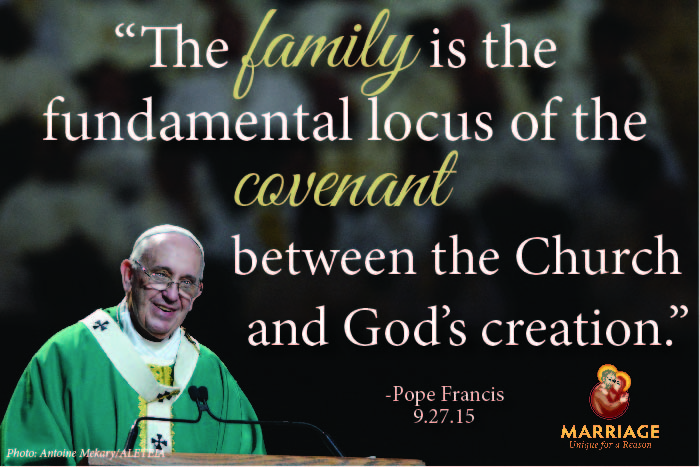
“The family is the fundamental locus of the covenant between the Church and God’s creation.”
“Locus” is not a word that is often used in conversation. According to the Merriam- Webster Dictionary, locus means: “the place where something is situated or occurs; a center of activity, attention, or concentration.” You could say that Philadelphia was a the locus of the pope’s trip to the United States; despite the other cities included in the trip, the Mass at the end of the World Meeting of Families was its main focus.
“Covenant” is a word with a long tradition in the Church. It means the exchange of persons; not a contract in which each person agrees to do something, but a promise to be someone. “I will be your God and you will be my people.” “I take you to be my wife” or “I take you to be my husband.” God makes a covenant with his people in creating them, and renews this covenant throughout the Old Testament as he chooses a people (the Jews) to be his own. The definitive covenant occurs when Jesus Christ offers himself for the sins of the world.
Now, looking at this quote from Pope Francis’s meeting with the Bishops in Philadelphia, we could read it as: the family is the primary place where God and the Church meet and give themselves to each other. This underscores the vital importance of the family. It is the ordinary means by which God enters into a person’s life. A strong family that brings children up to know, love, and serve the Lord is so important for the life of the Church that it is “fundamental.” While God’s grace can reach persons anywhere and anytime, it is the family that He ordained for that purpose. As the Holy Father said in his speech at the festival of families, “God always knocks at the door of hearts. He likes to do this. It comes from His heart. But, do you know what He likes best? To knock on the doors of families and find families that are united, to find families that love each other, to find the families that bring up their children and educate them and help them to keep going forward and that create a society of goodness, of truth, and of beauty.”
God desires to give his life and his grace to every human person, from the very beginning of their existence, which occurs within another human person. In the womb, God blesses a child (c.f. Ps 139:13). The Holy Spirit is present all along the way— He brings a man and a woman together in love, unites them in marriage, gives life through their act of love, strengthens a woman to give birth, and animates the continued growth of the family. He is a continual source of life for a man and woman united in sacramental marriage.
The family is also the place of the cross: how could it be otherwise, if it is the “locus of the covenant” which was wrought in the blood of Jesus? Infertility, disease, tragedy, pain and sin also enter into human experience through the family. God and the family meet and give themselves to each other through suffering as well as joy. This is a fundamental truth proclaimed by the Holy Father in September.
Archive
Call to Prayer: October 23, 2015
Archive
Defend the Family: Pope Francis at WMOF
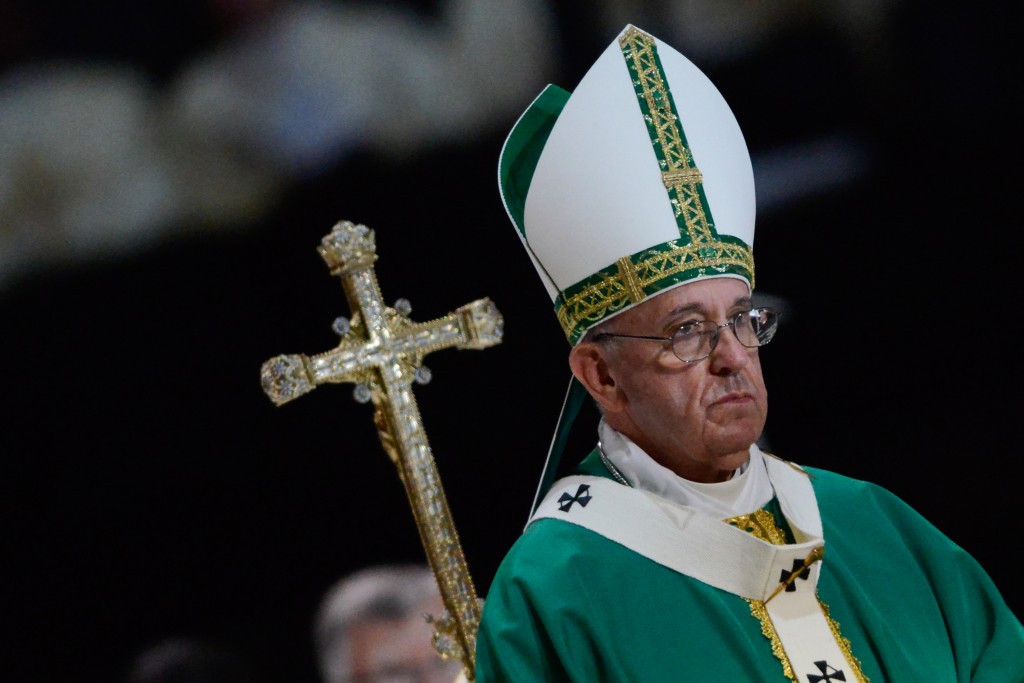
Photo: Antoine Mekary- Aleteia
Pope Francis at the World Meeting of Families: Seven Great Quotes
Pope Francis’s trip to the United States in September centered on his appearance at the World Meeting of Families in Philadelphia. We continue with the second quote in our series.
Festival of Families: “Let us defend the family, because there, there, our future is in play.”
If you’ve ever played a sport like soccer or basketball, you know that defense is critical. In order for your team to get downfield or down court to score, you must first have possession of the ball. Simple, right? But unless you won the kick off or tip off, getting possession means taking the ball away from the other team through defense.
One of the metaphors Jesus uses to describe His relationship to the Church is that of a shepherd who defends the flock, even with his life: “I am the good shepherd, and I know mine and mine know me, just as the Father knows me and I know the Father; and I will lay down my life for the sheep” (Jn 10:14-15). Later, this same image is used to assist bishops and priests in understanding their duty: to care for the flock until the Lord comes. “So I exhort the presbyters among you, as a fellow presbyter and witness to the sufferings of Christ and one who has a share in the glory to be revealed. Tend the flock of God in your midst, [overseeing] not by constraint but willingly, as God would have it, not for shameful profit but eagerly. Do not lord it over those assigned to you, but be examples to the flock. And when the chief Shepherd is revealed, you will receive the unfading crown of glory” (1 Peter 5: 1-4). Thus it should come as no surprise when the pope uses the language of defense, in particular for the family. It is abundantly clear that there are many forces in our culture today that work against the family: consumerism, distraction, overburdened schedules, technology, ideological impositions, separations by circumstance, and the list goes on. Against these movements, the Church must play “defense” even while promoting the truth, goodness, and beauty of marriage on “offense”. (The Subcommittee name itself reflects this two-part strategy: the Promotion and Defense of Marriage)
Pope Francis also references the future. Pope John Paul II wrote that, “The future of the world and of the Church passes through the family” (Familiaris Consortio, no. 75). The place where children come into being and grow is necessarily the place where the future is determined. There are strictly practical ways that this is true. Children are necessary for a society to continue, let alone flourish. No children, no future. No hope. Pope Francis has spoken of this a number of times, in particular when he addresses Europe. “In many quarters,” he said to the European parliament in November of 2014, “we encounter a general impression of weariness and aging, of a Europe which is now a ‘grandmother’, no longer fertile and vibrant.” At a general audience in October 2015, Pope Francis asked, “How loyal are we with the promises we make to children, making them come into our world? We make them come into the world and this is a promise — what do we promise them?” One thing that we could promise is to work to help ensure that a child’s right to be born and raised, as far as possible, by their married mother and father, is respected and honored.
In defending the family today, we defend children and make them a promise of a future of hope.
Archive
The Good, True, and Beautiful at the World Meeting of Families
Pope Francis at the World Meeting of Families: Seven Great Quotes
Pope Francis’s trip to the United States in September centered on his appearance at the World Meeting of Families in Philadelphia. Staff will write reflections on seven quotes from his visit.
From the Festival of Families: “All of the love that God has in Himself, all the beauty that God has in Himself, all the truth that God has in Himself, He gives to the family.”
Classical philosophers (think Socrates, Plato, Aristotle, etc.) refer to beauty, truth and goodness as the transcendental properties of being; aspects of being (or existence) that “transcend” or “go beyond” the thing that exists. God is all-in-all; He is the perfection of beauty, truth and goodness. Since He is Being (“I AM”), these attributes of being originate in God.
Let’s put this more simply. There’s the usual way we talk about goodness as a quality of a person: “Oh, she’s so good!” we may say, when we hear of a woman doing something charitable in our community. When we see obvious goodness— in Mother Theresa, for example—we see God within that action or person. But the goodness we’re talking about here, goodness as an attribute of being goes further. It means that the pure existence of something (or someone); that it is, is good. To love is to say to someone, “It is good that you exist,” regardless of whether that someone is annoying you at the time. A person does not have to do anything, in this case, to be good. The fact that they exist is the good. Think of babies. They are (or should be) loved because they are, not because they do anything special. This is a glimpse of God, who loves us into being and because He loves us, we are, we exist. As the pope said here, God gives the family this kind of love, this kind of total acceptance and goodness.
Secondly, beautiful things can draw us closer to God who is Beauty. Nature, art, music, etc. can all draw us out of ourselves (“ecstasy”) and lead us to seek the origin of the beauty we experience. Once again, beauty inheres (or is “stuck to”) anything that exists. Even a hairy spider (the author’s personal hatred) is beautiful in that it exists. God wills it into being. At the Festival of Families, Pope Francis said that God, who is love, gives to the family His own beauty. When you see a picture of a family that encompasses numerous generations, it is hard to deny this.
Lastly, if something is true, that means that it corresponds to reality; if I say, “There are three apples” and there really are three apples, then I speak the truth, and in speaking the truth about the apples, my mind is “in tune,” if you will, with God. God and I see the same thing (three apples). The family corresponds to the truth when it lives according to God’s laws (which are simply an expression of what reality is). What a family is, a community of life and love, is true.
How can you see the goodness, beauty and truth of your family today?
Archive
Call to Prayer: October 16, 2015
Archive
Archbishop Kurtz: Synod Intervention
Below is the expanded intervention given by Archbishop Kurtz, President of the USCCB, at the Synod on the Family:
In one of Pope Francis’ weekly reflections on marriage and the family leading up to the synod on the family, he spoke of the need “to give back a leading role to the family that listens to the word of God and puts it into practice” (Sept. 2, 2015). This theme – of giving leadership to the family – is also raised in the working document for the synod, which described the family as “an essential agent in the work of evangelization” and as having a “missionary identity” (“Instrumentum Laboris” 2, 5). I believe that a priority of the church, both at the synod and beyond, must be to call forth the indispensable witness of Christian families, and to form families to live their missionary vocation. In other words, the family should not only receive the church’s pastoral care (though it is essential that proper care be offered), but should also actively participate in the church’s mission. To that end, I propose two considerations.
First, we must trust in and announce anew the powerful, redemptive grace of Jesus Christ. Our way forward must always look to him with confidence. In the sacrament of marriage, Jesus himself abides with Christian spouses. The Holy Spirit penetrates the life of the spouses who are consecrated and equipped for their mission. We must trust in God’s grace as we help Christian husbands and wives embrace and live the truth of the sacrament they have received.
Second, as the synod seeks to offer concrete solutions to the many difficulties families face, we must enlist the help of the family itself in a very deliberate way and provide families with the formation they need to be active agents of evangelization.
We need families who can witness – even through their own wounds and difficulties – to the beauty of marriage and family life. The need for such families was made clear by Pope Francis in his homily at the opening Mass of the synod (Oct. 4, 2015). He pointed out a paradox: People today often ridicule the plan of God for marriage and family, but at the same time they “continue to be attracted and fascinated by every authentic love, by every steadfast love, by every fruitful love, by every faithful and enduring love.” Families who by the grace of God model tenderness, forgiveness and the joy of family life make marriage credible and show that the Gospel of the family is truly good news.
Evangelising as a family is done in the very midst of family life, “a place where evangelical holiness is lived out in the most ordinary conditions” (Pope Francis, address at prayer vigil for the synod, Oct. 3, 2015). Missionary families reach out to others. They can participate in the church’s mission as a field hospital, described beautifully by Pope Francis as: “doors wide open to whoever knocks in search of help and support … to reach out to others with true love, to walk with our fellow men and women who suffer” (homily, Oct. 4, 2015).
How do we promote this compelling vision of missionary families? Solid formation and support for families are essential. Just as the local church invests years of effort into future priests’ education and preparation for ministry, so, too, must we offer intentional and ongoing formation so that the family can truly live its missionary identity. Important here would be small groups of families who encourage each other in the ups and downs of family life and strong connections between the church in the parish and the church in the home (the domestic church).
Moving forward, I also believe the way we speak is important. We must not speak only “about” the family, but also “to and with” the family. We must “learn from the family, readily acknowledging its dignity, its strength and its value, despite all its problems and difficulties” (Pope Francis, address at prayer vigil, Oct. 3, 2015). Families face challenges and are wounded, yes, but they also possess incredible vitality and strength.
In sum, my hope is that the synod takes up and furthers the vision of families as active agents of evangelisation and missionaries, especially to other families. Even more, I hope that one fruit of the synod is increased attention to calling forth, forming and supporting families in their missionary vocation. Let us give back a leading role to the Christian family. In Christ is our confidence.
